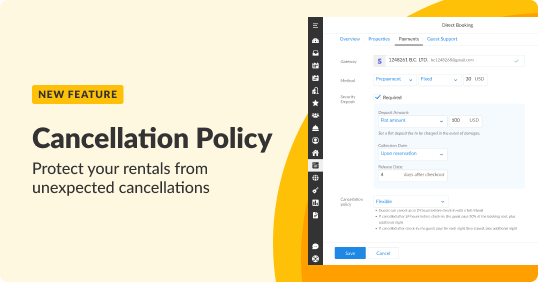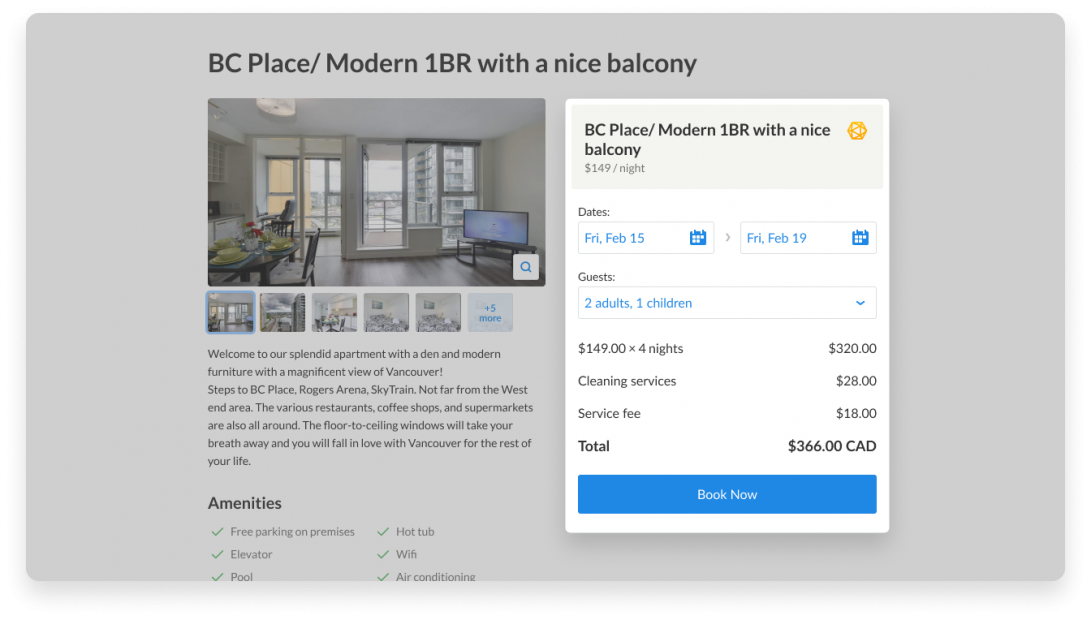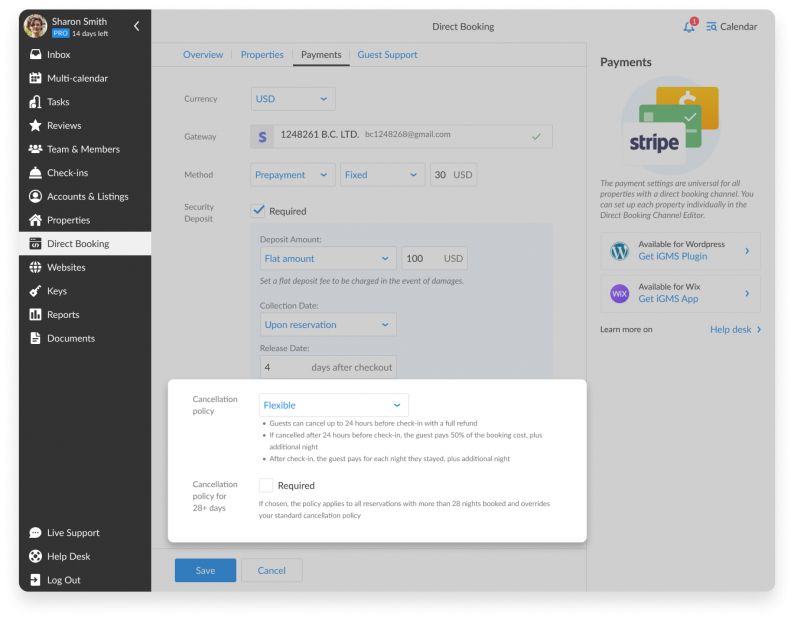Everything You Need to Know about a Cancellation Policy for Direct Bookings

Although it seems self-explanatory, a cancellation policy is something every host should keep in mind at some point. If you host on multiple platforms – Airbnb, Vrbo, Booking.com – you have to think of each platform separately. Many hosts and property managers, especially those just starting out, wonder which cancellation policy would be the best choice for their business. Here we will share some ideas on how you can use a cancellation policy for direct bookings on iGMS and how they align with a cancellation policy on the top booking platforms.
What is the purpose of a cancellation policy?
Cancellation policies protect hosts in the event of unexpected guest cancellations. If your guest’s travel plans suddenly change, it might become a problem, because there’s usually not enough time for you to find another reservation to fill the gap. This is why you need to have a cancellation policy in place before renting out your place online.
Cancellation policy on the top booking platforms
If you are an experienced host, you are probably familiar with cancellation policies on Airbnb and other major platforms. Each platform has its own cancellation policy. Let’s take a look at them.
- On Airbnb, both hosts and guests can cancel bookings, and there are several cancellation policy options you can choose from. As a host, you can partially be compensated for cancellations, depending on which cancellation policy you choose. One of the most popular options is Flexible. It can help you with rank higher in Airbnb’s search engines, and it can help to attract more bookings and keep your calendar full
- The Booking.com platform also provides several cancellation options. You can select either Flexible terms that allow guests to cancel without any penalties, or you can create your own policy. You can even pick the minimum notice period within which guests can cancel their reservation without incurring additional charges, and you can also authorize the guest to pay before arrival.
- When it comes to cancellation policies on Vrbo, hosts have 6 options. One of them is custom-made, while the other five offer different levels of flexibility. When opting for cancellation policies, it may make sense from a host’s perspective to go for the strictest one, but it won’t always sit well with guests, especially if they have never met you or experienced your service.
When selecting a cancellation policy, you will have to take into consideration which option is best for your property. Stricter cancellation policies may protect you more as an owner, but flexible cancellation options are usually more popular among potential guests. Finding a middle ground that benefits both you and your guests is ideal.
How do you encourage your guests to book directly?

It is important to list properties on Airbnb, Vrbo, and Booking.com platforms. However, if you rely only on OTAs, you are not exploring your earning potential to the fullest. When a guest books directly through your website, you don’t have to pay any fees or commissions to the booking sites. This means that you can offer better and more competitive prices and still earn more for every booking.
Here are some ideas on how you can encourage guests to book directly with you.
Create and develop your personal brand and identity
If you want to encourage more reservations via your website, it should be trustworthy and user-friendly. If you do not have a website yet, we recommend starting with our Website Builder that allows you to create a direct booking website in 5 minutes without any coding skills.
Spice up your social media strategy
Update your social media regularly. A lot of travelers use social media for travel inspirations and prefer doing online research to plan their trip. It’s really important to keep your social media up to date and make posts consistent.
Create a separate pricing strategy and offer a deal
You can always offer a better deal directly, mainly because you do not have to pay any extra fees or commissions. You can either play around with pricing or consider another option. It can be anything: personalized service, complimentary experiences, etc. It’s not only a good way to encourage people to book directly, but also to make their stays memorable.
Before you start receiving direct booking reservations, it’s important to learn about different types of cancellation policies that will help you to protect your property in case guests change their plans.
How do you choose the right cancellation policy for your vacation rental business?

Each cancellation policy has its own pros and cons that you should keep in mind before choosing one for your property. Let’s take a look at some of the policies that you can set up on iGMS.
Non-refundable
If you do not want to offer any refund regardless of the circumstance, you can use this cancellation policy for your rental. Though, it might be too strict for some guests who prefer to have at least some flexibility. Keep in mind that for some people, it might be the reason for not booking your place.
Flexible
This cancellation policy allows the greatest guest freedom. Up until 24 hours before check-in, the guest is entitled to a full refund. This type of cancellation policy will help you to keep the calendar virtually fully booked and gives your guests more flexibility. However, there’s a downside as well. As a host, you are not protected against cancellations and bear all the risk.
Moderate
The Moderate policy is more restrictive than the Flexible one. Guests can receive a full refund only if they cancel at least 5 days before the check-in. With this type of policy, hosts are better protected against cancellation losses and there are better chances that you will attract more serious guests. On the other hand, after the cancellation, it might not be that easy to find another guest for these dates.
Strict
The name of this policy is self-explanatory. It allows guests to receive a full refund if they cancel within 48 hours of booking and at least 14 days before a listing’s check-in time. This policy discourages guests from cancellations, and, in case a cancellation occurs, you will have enough time to receive a new booking. On the other hand, a property with such a policy might be less likely to be booked.
Long-term stays
In case you prefer guests staying at your property for more than 28 days, there’s also a special Long-term cancellation policy for you. To receive a full refund, guests must cancel 30 days in advance. The main advantage of long-term stays is that if a guest cancels, you still have enough time to receive another reservation. However, before accepting a long-term reservation, you should keep in mind that long-term stays might have a lower earnings potential because your property is more vulnerable to damage by long-term guests.
Conclusion
Choosing the best cancellation policy for your business requires some careful thought and consideration. Thankfully, the day-to-day management of your business can be simplified with the help of automation. Vacation rental software, like iGMS, can automate a bunch of your routine hosting tasks, allowing you to focus on growth, by:
- Seamlessly managing all listings from Airbnb, Vrbo, and Booking.com
- Organizing all guest messages into a single feed in a unified inbox
- Creating a professional direct booking website in minutes
- Processing online payments securely via Stripe integration
Why not try out all the iGMS tools for yourself? We would like to invite you to join our weekly live webinars and start your free 14-day trial.







![Your Monthly iGMS Roundup [February 2020]](/content/images/size/w600/wordpress/2020/02/igms-roundup-feb-2020-cover.png)

